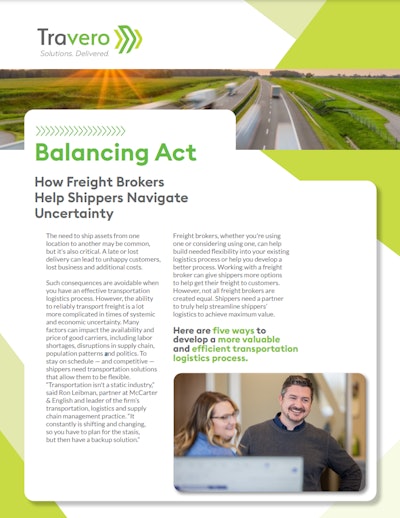
*This content is sponsored by Travero Inc.*
The need to ship assets from one location to another may be common, but it’s also critical. A late or lost delivery can lead to unhappy customers, lost business and additional costs.
Such consequences are avoidable when you have an effective transportation logistics process. However, the ability to reliably transport freight is a lot more complicated in times of systemic and economic uncertainty. Many factors can impact the availability and price of good carriers, including labor shortages, disruptions in supply chain, population patterns and politics. To stay on schedule — and competitive — shippers need transportation solutions that allow them to be flexible.
“Transportation isn't a static industry,” said Ron Leibman, partner at McCarter & English and leader of the firm’s transportation, logistics and supply chain management practice. “It constantly is shifting and changing, so you have to plan for the stasis, but then have a backup solution.”
Freight brokers, whether you're using one or considering using one, can help build needed flexibility into your existing logistics process or help you develop a better process. Working with a freight broker can give shippers more options to help get their freight to customers. However, not all freight brokers are created equal. Shippers need a partner to truly help streamline shippers’ logistics to achieve maximum value.
Download this asset for five ways to develop a more valuable and efficient transportation logistics process.





![Pros To Know 2026 [color]](https://img.sdcexec.com/mindful/acbm/workspaces/default/uploads/2025/08/prostoknow-2026-color.mduFvhpgMk.png?ar=16%3A9&auto=format%2Ccompress&bg=fff&fill-color=fff&fit=fill&h=135&q=70&w=240)
